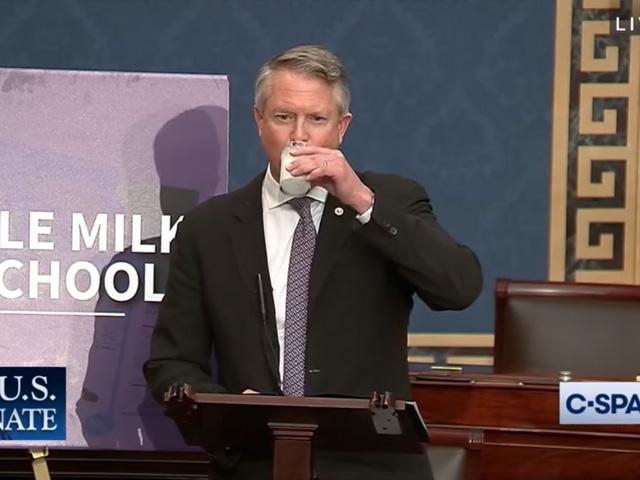Ag Policy Blog
Got Whole Milk? Santa Might Get Some, But Schools Kids Will Have to Wait
U.S. Sen. Roger Marshall tried to get unanimous consent on the Senate floor Thursday for a bill that return whole milk to school lunches, but his effort was quickly thwarted by the chairwoman of the U.S. Senate Agriculture Committee
Marshall, R-Kansas, brought up H.R. 1147, the Whole Milk for Healthy Kids Act, which passed the House on Wednesday with a bipartisan 330-99 vote. A unanimous consent nod in the Senate would have immediately sent the bill to President Joe Biden's desk.
Marshall went to the Senate floor and began his speech drinking a glass of whole milk. The senator pointed out that water and milk are the only drinks allowed on the U.S. Senate floor.
"Milk is the most delicious, most nutritious wholesome drink known to humankind. There's nothing else ever been made anything like it," Marshall said.
Marshall said his dad grew up on a Holstein dairy. He also remembered drinking two
"I just learned, I just know this -- I just assumed this is what everyone was doing -- that if you didn't leave whole milk out for Santa Claus, then he wouldn't leave you presents," Marshall said.
Countering some of the arguments over why whole milk was removed from school-lunch menus more than a decade ago, Marshall said the fat content in whole milk supports the absorption of fat-soluble vitamins A, D, E and K.
"Milk's part of the solution, not part of the problem."
Dietary guidelines cite that too many Americans now have deficiencies in calcium, potassium and vitamin D. A generation of people could face early onset of bone-related diseases because of the lack of whole milk in their diets. The decision to remove whole milk from school lunches was "federal government overreaction based on obsolete research," Marshall said.
Yet, when Marshall asked for unanimous consent to approve the bill, Sen. Debbie Stabenow, D-Mich., chairwoman of the Senate Agriculture Committee, objected. Stabenow said Marshall's speech "is making me hungry. I'm thinking about growing up with cookies and milk and I grew up with dairy farmers in my family."
P[L1] D[0x0] M[300x250] OOP[F] ADUNIT[] T[]
Stabenow said she supports the dairy industry and called the debate on whole milk "a really important conversation" Still, Stabenow indicated government policy over school meals shouldn't come down to which commodity garners support among lawmakers.
"Dairy is a very important part of a balanced meal, but one thing that's clear is that school-meal standards -- currently based on dietary science -- should continue to be based on dietary science, not based on which individual food product that we support or are in our states," Stabenow said.
Stabenow added USDA is in the process right now of updating school-meal standards. She said it's important the administration rely on the latest dietary science.
"Intervening in that process I think creates a very unfortunate precedent and will lead to other ideas and options that may be coming forward about individual products.
Stabenow encouraged groups to reach out to USDA about the school-meal standards to engage in the process about updating meal standards. "At this point in time, I do not believe it is in the best interest to move forward on this bill."
HOUSE VOTE
The House vote drew strong support Wednesday, and praise from dairy groups. The bill was introduced by House Agriculture Committee Chairman Glenn "GT" Thompson, R-Pa., who was acting in his role as a member of the House Education & the Workforce Committee, and Rep. Kim Schrier, D-Wash.
Rep. Chellie Pingree, D-Maine, praised the action. "Rich in calcium and vitamin D, milk is an essential part of children's growth and development. There is simply no reason why schools should not have the option to offer whole milk to its students. Further, whole milk is one of the most popular varieties of milk," she said. "I proudly co-sponsored and helped pass the bipartisan Whole Milk for Healthy Kids Act because it will not only help Maine students thrive at school, but it will also support local dairy farmers and local economies."
Opponents countered in similar fashion to Stabenow in pointing out what dietary guidelines recommend.
"The latest DGAs -- along with the American Heart Association, American Academy of Pediatrics, the Physicians Committee for Responsible Medicine, the Academy of Nutrition and Dietetics, and over a dozen other public health advocates -- agree that fat-free and low-fat milk are the healthiest options for children," said Rep. Bobby Scott, D-Va., ranking member of the House Education & the Workforce Committee.
"Regrettably, H.R. 1147 attempts to legislate nutrition standards and disregard evidence-based recommendations made by the DGAs. Furthermore, the bill would undermine the Biden administration's ongoing rulemaking to better align school nutrition standards with the latest science."
Still, the National Milk Producers Federation and International Dairy Foods Association both strongly back the bill.
See, "House Votes to Reinstate Whole Milk in Schools,"
Chris Clayton can be reached at Chris.Clayton@dtn.com
Follow him on X, formerly known as Twitter, @ChrisClayton
(c) Copyright 2023 DTN, LLC. All rights reserved.






Comments
To comment, please Log In or Join our Community .